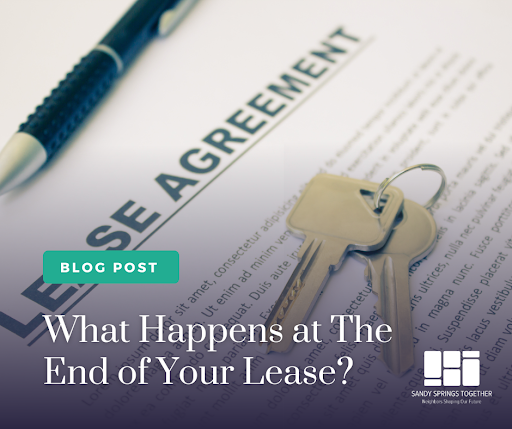This is the third blog in our series on Renters’ Rights. Click here or below to read our first two blogs in this series; you don’t want to miss any of the CRUCIAL information that’s being shared.
- Apartment Lease Review: What You Need to Know BEFORE You Sign a Lease
- How to Handle Apartment Maintenance Problems
Renters make up over half of the residents in Sandy Springs. As a renter, one of the most important things you can do is to arm yourself with knowledge about your rights. That is why Sandy Springs Together hosted a Renters’ Rights Summit in November 2023. One topic that was discussed is the termination of your lease.
The content that follows is intended to inform the reader and is not meant to be legal advice.
The landlord and tenant may only end a written lease according to its terms. A lease can be terminated, extended or renewed at the end of its term depending on what the lease says.
- Termination: If the lease expires or otherwise ends, the landlord can require that you immediately sign a new lease with new terms or leave. If a new lease is not signed, and the landlord continues to accept monthly rent, the terms of the original lease still apply, except the landlord is required to give 60 days’ notice before terminating the lease or changing the terms, and you are required to give 30 days’ notice before leaving.
- Extension: A lease may allow you to stay longer under the same lease provisions through automatic extension at the end of the current lease unless you give notice that you want to leave. If your lease allows that, and you do not notify the landlord that you plan to leave, you could end up responsible for another lease term.
- Renewal: A lease may allow the tenant to renew by signing a new lease. If your lease allows that, you must give the landlord written notice of your intention to renew the lease. If you do not timely renew the lease, the landlord may treat the lease as expired at the end of the term and take back the rental property.
One of the biggest areas of dispute for renters is the return of the security deposit. When you are moving out of your rental property you should clearly document the condition of the property by taking photos and video of every part of your rental unit, including appliances. This will document the condition of the property you are leaving. Hopefully, you have also retained pictures and an inspection report from when you initially took possession of the property at move-in. Here are a few additional things to keep in mind:
- The landlord must inspect the unit and prepare a list of all damage beyond normal wear and tear. The landlord must sign the list and provide it to you listing every item and the associated charge.
- You must sign the move-out inspection list or specify in writing the items you disagree with and why.
- Landlords must return the security deposit within 30 days after termination of the lease or the date that you leave the premises, whichever occurs last.
A landlord must have a legal reason to terminate your lease early. In Georgia, those legal reasons are failing to pay rent or violating the terms of the lease or rental agreement.
Eviction is a legal process a landlord must follow in order to remove a tenant from the rental property and terminate the lease. It is illegal to evict outside of the court process by removing belongings, terminating utilities or intimidation.
To perform a legal eviction, the following actions must take place:
- The landlord serves an eviction notice called a demand for possession of property either verbally or in writing.
- The landlord files an eviction lawsuit with the court.
- The court serves a summons to the tenant from the State of Georgia and the county of residence stating the reason for the eviction.
- The tenant has 7 days to respond to the notice. DO NOT IGNORE the notice. You must file an answer with defenses (for example, failure to repair, retaliation, etc) You can also file a counterclaim.
- The landlord and tenant attend a court hearing and receive judgment. Keep documentation as evidence and bring it to court. This includes photos, emails, text messages, receipts or anything that helps tell your side of the story.
- If the judgment is in favor of the landlord, the tenant has seven days to move out and/or appeal the judgment.
Resources:
Atlanta Volunteer Lawyers Foundation – provides free legal services to lower-income residents. Their services include landlord/tenant disputes, domestic violence/intimate partner abuse, evictions etc.
Esther Graff-Radford – private litigation attorney; tried the first landlord harassment case in Georgia.
Georgia Appleseed – Georgia Appleseed advocates for reforms large and small, local and statewide, that increase access for low-income children and their families to stable, healthy housing and out of the criminal justice system
Georgia Appleseed Healthy Housing Advocacy Handbook
Atlanta Legal Aid Society- Helping low income people meet basic needs, removing barriers to justice through civil legal assistance. https://atlantalegalaid.org/
Georgia Department of Community Affairs: The Georgia Landlord – Tenant Handbook





